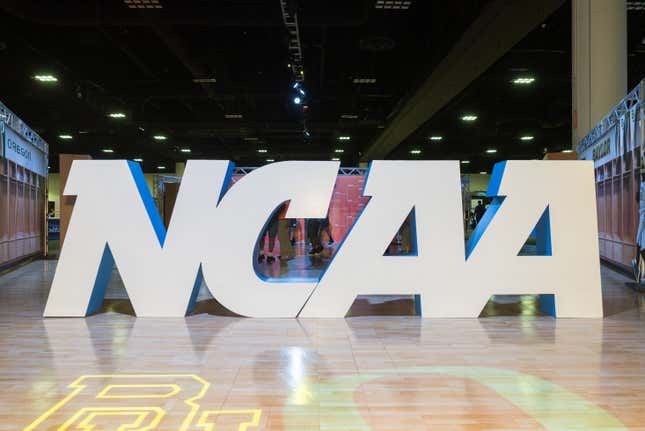
On Wednesday, I was minding my Black-ass business while indulging in my favorite pastime—devouring crab legs—when this happened:
In my confusion, I assumed Boiling Crab’s Rajun Cajun sauce was so magnificent that it was making me hallucinate. But nope! Per ESPN, the NCAA has actually come to its senses—kinda:
The NCAA’s board of directors decided Wednesday to officially suspend the organization’s rules prohibiting athletes from selling the rights to their names, images and likenesses. The new rules represent a major shift in the association’s definition of amateurism—a shift that NCAA leaders previously believed was antithetical to the nature of college sports.
Now does that mean that players will be compensated for the billions of dollars they generate for the NCAA? Nope. But it does mean that beginning on Thursday, every single NCAA student-athlete in the country will be able to cash in on endorsement deals and other ventures. And that’s a big goddamn deal.
“This is an important day for college athletes since they all are now able to take advantage of name, image and likeness opportunities,” NCAA president Mark Emmert said in a statement. “With the variety of state laws adopted across the country, we will continue to work with Congress to develop a solution that will provide clarity on a national level. The current environment—both legal and legislative—prevents us from providing a more permanent solution and the level of detail student-athletes deserve.”
So what will this new era in sports look like?
While schools are still prohibited from paying student-athletes for the use of their NIL (name, image, and likeness) or for any other purpose, boosters have the green light to make it rain on players as long as those payments are not directly tied to “their athletic performance or an inducement for recruiting purposes,” per ESPN. As for whether or not schools can arrange NIL opportunities for their players, there are state laws in place that prohibit schools from doing so. Of additional note, the NCAA leaves that decision up to schools with the caveat that if things get a little too murky, they could subject themselves to harsh penalties.
There’s also this gem, courtesy of ESPN:
State laws and policies crafted by individual schools create an inconsistent variety of restrictions for athletes depending on where they attend school. In some places, athletes can’t endorse alcohol, tobacco or gambling products. Others have some restrictions on whether athletes are allowed to use school logos and other copyright material in any paid opportunities.
Most states and schools also prohibit athletes from signing any deals that conflict with the school’s sponsorship agreements. For example, a basketball player on a team sponsored by Nike would not be allowed to wear Adidas shoes during games. However, in most cases, that athlete could promote a non-Nike shoe company during times when not playing games or participating in other team activities.
This could also have a profound impact on the NBA Draft. Many players announce their decision to declare for the draft because of their need to provide for their families. But if they can leverage their collegiate star power and massive social media followings into lucrative deals worth hundreds of thousands of dollars, if not more, what’s the rush to get dunked on by Ja Morant?
In an op-ed for the L.A. Times, former UCLA star Ed O’Bannon, who famously sued the NCAA in 2009 over NIL rights, reflected on his own war against the NCAA and shared his thoughts on Wednesday’s victory.
“I know people are excited for college athletes to be able to use their NILs,” he wrote. “I’ll keep up, check them out and see what they’re doing, but again, my job is done. [...] I will watch from a distance. I just hope everybody is happy.”
Dan Gale, president of the college athletics consulting firm Leona Marketing Group, believes collegiate sports are in for a bumpy ride.
“The impact is going to be weird, bad and ugly, because it’s dirty,” he told Sports Illustrated “In three years, we’ll be fine. It will be different, but it will be fine.”
“It’s going to be a clusterfuck,” an anonymous source also told S.I. “Buckle up.”
Both might be right, but at least that arduous road will be paved with dollar signs. And more importantly, players are closer than ever before to being properly compensated for the value they bring to universities throughout the country.

